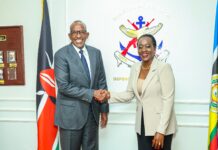The Uganda Virus Research Institute (UVRI) has announced that Genetically modified mosquitoes will be ready within a decade in a bid to tame malaria.
The “Gene-drive mosquitoes” are one of the anti-malarial strategies implemented as part of the Africa Target Malaria project, which the government has been working on since 2016 to reduce the number of deaths caused by malaria.
A gene-driven mosquito is one that has had its genes altered to make it immune to the parasites that cause malaria.
Gene drive is carried out in two ways: one aims to reduce the size of the vector population, known as population suppression, and the other aims to prevent the mosquito from transmitting malaria, known as population modification.
Dr. Jonathan Kayondo, one of the project’s researchers, says the research is being conducted in malaria-prone areas throughout the country, and he is optimistic that the research will bear fruit.
“If the non-Gene-drive (sterilized) mosquitos respond positively at every stage, we may be able to have the Gene0-drives in 10 years,” Dr. Kayondo said during an anti-malarial training for journalists designed to fill information gaps about the project.
He also stated that the researchers are currently investigating ways to develop sterile male mosquitoes in order to reduce the number of female anopheles mosquitoes that spread malaria before introducing gene drives to the community.
“The intention is to reduce the number of female-malaria spreading mosquitoes in the population by having them also lay fewer female mosquito eggs compared to the 300 eggs that a natural female anopheles mosquito lays,” he said.
According to the World Health Organization (WHO), malaria is currently the most lethal mosquito-transmitted disease.
In 2021 alone, WHO reported an estimated 247 million cases of malaria worldwide and 619,000 deaths. Almost all cases and deaths were in African countries.
Only five countries have been declared malaria-free by WHO among them Algeria (2019), Lesotho (2012), Seychelles (2012), La Réunion (1979), and Mauritius (1973).



















